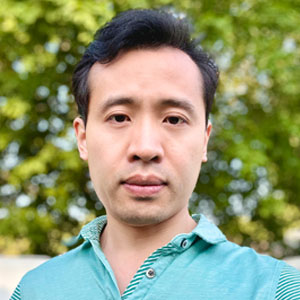
Dr. Peng Li
Assistant Professor of Medicine, Harvard Medical SchoolLead Investigator, Brigham and Women’s Hospital
Research Director, Medical Biodynamics Program
Speech Title: Analytical Approaches for Circadian Rest-Activity Rhythms and New Insights into Cognitive Aging
Abstract: Activities of living species are regulated by an internal clock with a near 24-h cycle in synchrony with the Earth’s rotation. It has been hardwired into biology with the evolution of life. Chronobiology is a field devoted to studying biological rhythms. Analytical approaches have been developed over the years to characterize the rhythms and to understand the intactness of circadian function. Circadian disturbances are emerging as potential contributors to adverse health consequences including neurocognitive disorders or degenerations such as Alzheimer’s disease (AD). Animal models also demonstrate a putative causal role of circadian dysregulation and AD pathogenesis. In this talk, Dr. Li will present both classical and new approaches in the field of chronobiology to analyze continuously monitored physiological signals for circadian rhythms or function. He will then present results from his translational studies in older as well as middle- to older-aged adults that provide novel insights into cognitive health and cognitive aging. Dr. Li will talk about the interplay between aging and Alzheimer’s that differentially influence the longitudinal profile of circadian rhythms. He will also present results that demonstrate a potential bidirectional link between circadian dysregulation and cognitive impairment or AD.
Funding: The research resented in this talk was partially supported by the BrightFocus Foundation (A2020886S), a Developmental Award from the Harvard University Center for AIDS Research, a Pilot Study Award from the HIV and Aging Research Consortium, and the Fund to Sustain Research Excellence from the Brigham Research Institute. The work was also partially supported by the NIH.
Biography: Dr. Li is a biomedical engineer and computational physiologist doing research at the interface of medicine and engineering. Dr. Li is a Senior Member of the Institute of Electrical and Electronics Engineers (IEEE). His research has been focused on evaluating cardiovascular and cognitive aging and assessing the risk for developing cardiovascular diseases and dementia by noninvasive and cost-effective approaches. Dr. Li’s major contributions to science and/or technology are three-fold:
1. Assessing sub-clinical cardiovascular function and/or risk by designing novel signal processing tools.
One of Dr. Li’s most important early works (> 8 years ago) is the development of distribution entropy and several of its variants to assess physiological complexity based on short-length signals. Prior to this work, a reliable assessment of complexity requires long data. In contrast, physiological recordings collected in standard clinical settings (e.g., routine screening ECGs at rest) are short and, thus, unsuitable for complexity analysis. This has been the main barrier to utilizing complexity for functional assessment and outcome prediction in real-world practice. The new algorithm was designed to fundamentally address this limitation by considering an integrated feature in the fluctuation patterns of the signal, allowing a reliable assessment of complexity from short recordings.
2. Understanding sleep and circadian health, cognitive aging, and dementia etiology.
Dr. Li’s research in the recent 8 years has contributed to the understanding of sleep and circadian disturbances as early-stage manifestations or risk factors of AD. His research has helped advance the understanding of simultaneous degradations in cognition and sleep/circadian rhythms with advanced age and clarified the bidirectional relationship between cognitive decline and circadian degradation in human participants. A highlight of his recent discoveries in this field is the link between altered daytime napping and risk for AD, which opens a new research avenue to understand behavioral rhythms or sleep behaviors in dementia etiology and to design potential interventional strategies through consolidating sleep behaviors or sleep hygiene for cognitive benefits.
3. Addressing disparities in physical and cognitive resilience in diverse populations.
Dr. Li’s research in the last 3 years has also been expanded to the study of physical and cognitive resilience in the context of sex/gender and racial minorities as well as people living with chronic inflammation burdens, who show a disproportionately higher burden of age-related comorbidities. His recent study showed that, while sleep behaviors were not associated with cognitive performance in middle-aged HIV-uninfected people, they were highly associated in people living with HIV, underscoring a need to understand HIV-associated accelerated or accentuated aging in the context of sleep health. His most recent pilot study found that sleep disturbances were linked to physical frailty in people with HIV in an African setting, implying a need to understand how social or structural determinants of health contribute to sleep, leading to varied health anticipations.
